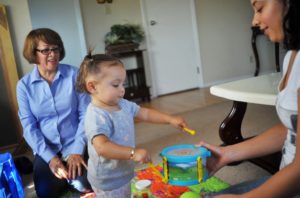Birth to age eight represents a unique developmental period during which young children acquire foundational physical, cognitive, and executive function skills—the ability to persist, concentrate, retain information, think flexibly, and exhibit self-control.
To cultivate this potential, it is imperative that Delaware follow the first recommendation listed under the Early Learning core area in Student Success 2025:
Increase access to evidence-based home-visiting services for families of children most at-risk for school failure.
Home-visiting programs employ trained social service professionals and nurses to address the various needs of young children and their families. Delaware offers a wide range of evidence-based home-vising programs such as:
Nurse Family Partnership: An evidenced-based community health program that helps transform the lives of vulnerable mothers pregnant with their first child. Each mother served by Nurse Family Partnership is partnered with a registered nurse to receive home visits from prenatal through the baby’s second birthday. Mothers, babies, families, and communities all benefit.
Healthy Families America: The Healthy Families America/Smart Start Program helps expectant and new parents get their children off to a healthy start. The program strives to provide parents an opportunity to get the education and support they need at the time their baby is born, and until their child turns three.
Parents as Teachers: Parents as Teachers partners with local providers to help young children and families in recovery. The organization provides programs that support all parents of children from birth to kindergarten entry.
Early Head Start: Head Start is a Federal program that promotes the school readiness of children from birth to age five from low-income families by enhancing their cognitive, social, and emotional development. Head Start programs provide a learning environment that supports children’s growth in many areas such as language, literacy, and social and emotional development. Head Start emphasizes the role of parents as their child’s first and most important teacher as well as works with families until a child’s third birthday.

Home-visiting programs are wonderful examples of two-generation strategies because they benefit parents as well as children and can also be used as a connector to quality childcare programs.
However, the challenge continues to be enrolling Delaware families early in the process to increase the impact of this service. Research shows that 65,400 children and 50,400 families could benefit from home-visiting services, which is why I look forward to working with my fellow Leadership Team members, partners, and communities across the state to identify smarter ways to use the home-visiting resources.
If you are interested in participating in home-visiting services, there is a common referral form here. Referrals can be made directly by the families themselves or by physicians, social service providers, early care providers, faith based community organizations or others that see the need. Referrals can also be made through 211 Help Me Grow hotline.
——————————————————————————————————————–
Vision Coalition Leadership Team Member Leslie Newman has been with Children & Families First of Delaware since 2007. She is currently a member of the Early Childhood Council and the Home Visiting Advisory Board.


